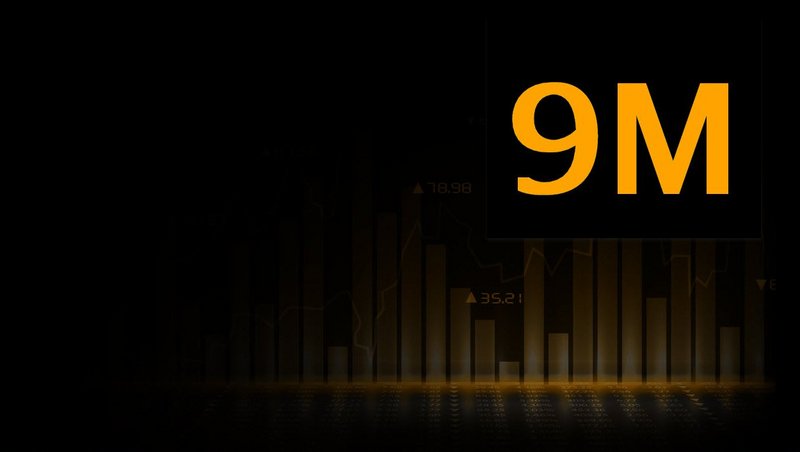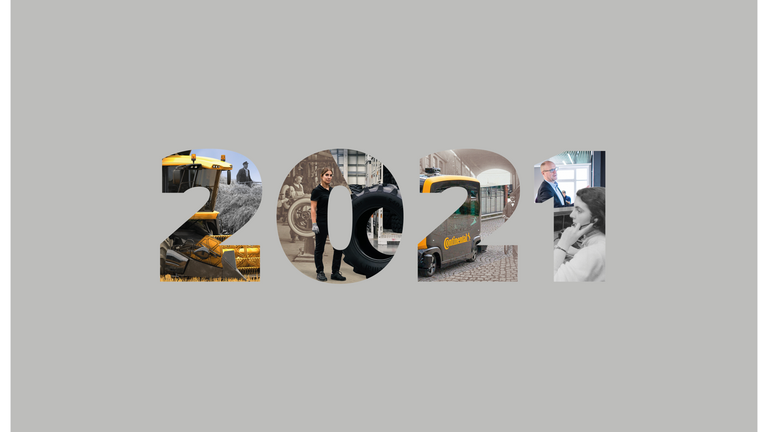Third Quarter: Continental Sets Course for Next Successful Chapter in its History
- Continental accelerates market-oriented realignment in its anniversary year
- Semiconductor shortage likely peaked in the third quarter
- Automotive Technologies particularly affected due to high share of electronics
- Rubber Technologies posts robust earnings thanks to replacement-tire and industrial businesses
- Spin-off of Vitesco Technologies successfully completed
- Consolidated sales of €8.0 billion (Q3 2020: €8.7 billion, -7.4 percent);
organic growth of -8.5 percent - Adjusted EBIT of €419 million (Q3 2020: €727 million, -42.4 percent)
- Adjusted EBIT margin of 5.2 percent (Q3 2020: 8.4 percent)
- Net income of €309 million (Q3 2020: -€719 million, up €1.0 billion)
- Free cash flow before acquisitions, divestments and carve-out effects for continuing and discontinued operations: €12 million (Q3 2020: €1.8 billion)
- Outlook for fiscal 2021: consolidated sales of around €32.5 billion to €33.5 billion; adjusted EBIT margin of around 5.2 to 5.6 percent
Hanover, November 10, 2021. In the third quarter of its anniversary year, Continental set the strategic course for the next successful chapter in its history by making its previously announced structural adjustments. At the same time, the delivery situation for electronic components worsened. This had a significant impact on sales and earnings, which was only partially offset by the positive trend in sales volumes of replacement tires and industrial products.
“Our Rubber Technologies group sector achieved robust earnings thanks primarily to the strong replacement-tire and industrial product businesses. It achieved this success despite the mounting burdens associated with rising raw material prices and energy and logistics costs,” explained Nikolai Setzer, Continental CEO, when presenting the quarterly figures on Wednesday in Hanover. “At the same time,” he added, “the global semiconductor shortage worsened in the third quarter due to the coronavirus situation in Southeast Asia and likely reached its peak. This affected in particular our Automotive Technologies group sector, whose product portfolio comprises a high share of electronics. While we are severely affected by the current semiconductor shortage, there is no doubt that vehicles will be equipped with more and more electronics, sensors and software in the future. With our product portfolio, we will therefore benefit greatly from this trend.”
Although Continental expects the supply situation to improve in the coming months, the semiconductor shortage and rising raw material prices are likely to continue to have a negative impact on the automotive industry in the fourth quarter of this year and throughout 2022.
“Despite the short-term challenges, we successfully completed the spin-off of Vitesco Technologies in the past quarter. With the new structure that we have put in place in our anniversary year, we have also set the strategic course for the next successful chapter in our company’s history. The pooling of our expertise, particularly in the area of software, will benefit both us and our customers,” emphasized Setzer.
Consolidated sales down year-on-year in the third quarter
At €8.0 billion, consolidated sales were down year-on-year in the third quarter (Q3 2020: €8.7 billion, -7.4 percent) due to significantly lower vehicle production. Before changes in the scope of consolidation and exchange-rate effects, sales fell by 8.5 percent. Adjusted EBIT decreased year-on-year to €419 million (Q3 2020: €727 million, -42.4 percent). This resulted in an adjusted EBIT margin of 5.2 percent (Q3 2020: 8.4 percent).
Net income totaled €309 million (Q3 2020: -€719 million). Free cash flowbefore acquisitions, divestments and carve-out effects for continuing and discontinued operations reached €12 million in the third quarter, compared with €1.8 billion in the same quarter of the previous year due to the strong recovery effects following the coronavirus lockdown.
Global automotive production lower than previous year’s level
Global automotive production suffered from the shortage of semiconductors and therefore did not reach the level of the previous year’s quarter. The supply of components was the limiting factor, with customer demand remaining high. According to preliminary figures, global automotive production amounted to 16.5 million units from July to September 2021, down nearly 20 percent from the same period of the previous year (Q3 2020: 20.5 million units). In North America, production figures fell by around 25 percent to 3.0 million units (Q3 2020: 4.0 million units), in Europe by roughly 30 percent to 3.0 million units (Q3 2020: 4.3 million units) and in China by around 17 percent to 5.3 million units (Q3 2020: 6.4 million units).
Market outlook and forecast for fiscal 2021
“The global markets will remain highly volatile in the coming months. Given the ongoing shortages of semiconductor components as well as uncertainties in the supply chain and customer demand, we have adjusted our forecast for 2021,” said Wolfgang Schäfer, Continental’s CFO. The company expects global production of passenger cars and light commercial vehicles to change by between -1 and +1 percent year-on-year in 2021 (previously: to increase by 8 to 10 percent).
Negative effects from cost inflation for key inputs including electronics and electromechanical components for Automotive Technologies, raw materials for Rubber Technologies as well as energy and logistics are becoming more material.
As announced on October 22, 2021, Continental has therefore adjusted its full-year outlook and now anticipates consolidated sales of around €32.5 billion to €33.5 billion (previously: €33.5 billion to €34.5 billion). The adjusted EBIT margin is expected to be between around 5.2 to 5.6 percent (previously: 6.5 to 7.0 percent).
For the Automotive Technologies group sector, Continental expects sales of around €14.5 billion to €15.0 billion (previously: €16.0 billion to €16.5 billion). As a result of the lower sales expectations, the adjusted EBIT margin is expected to be in the range of around -2.0 to -2.5 percent (previously: 0.5 to 1.0 percent). The outlook continues to include additional logistics expenses of around €200 million in connection with shortages of semiconductor components, while additional expenses for research and development in the growth area of assisted and automated driving are now expected to total around €100 million to €150 million (previously: €150 million to €200 million).
Sales in the Rubber Technologies group sector are now expected to be around €17.2 billion to €17.5 billion (previously: €17.2 billion to €17.8 billion), with an adjusted EBIT margin of around 12.3 to 12.7 percent (previously: 12.5 to 13.0 percent). The outlook takes into account a year-on-year rise in raw material costs of around €550 million (previously: €500 million) as well as price increases for energy and logistics. The higher costs relate primarily to the Tires business area.
For the Contract Manufacturing group sector, sales of around €800 million to €900 million and an adjusted EBIT margin of around 9 percent are expected.
Capital expenditure before financial investments is expected to total around 6 percent of sales (previously: 7 percent).
Free cash flow before acquisitions, divestments and carve-out effects for continuing and discontinued operations is expected to be around €800 million to €1.2 billion
(previously: €1.1 billion to €1.5 billion for continuing operations).
Automotive Technologies: orders for display solutions totaling around €5.5 billion
Sales in the Automotive Technologies group sector decreased in the third quarter of 2021 by 15.9 percent to €3.5 billion (Q3 2020: €4.1 billion). This decline was due to lower vehicle production. The adjusted EBIT margin was -2.3 percent (Q3 2020: 1.9 percent). Organic growth came to -17.3 percent, while global production of passenger cars and light commercial vehicles fell by nearly 20 percent in the same period.
At the end of September, Continental signed an agreement with Horizon Robotics to establish a joint venture based in Shanghai, China. The aim is to integrate the processors and algorithms from Horizon Robotics into smart cameras and electronic control units for advanced driver assistance systems and automated driving from Continental, and to give Horizon Robotics a global reach and production base for its technology. The company will supply both the Chinese market and international automotive manufacturers worldwide.
In addition, Continental generated further orders for display solutions, taking the sales volume associated with these orders to a total of around €5.5 billion.
Rubber Technologies: sales growth in the third quarter
The Rubber Technologies group sector continued to demonstrate its robustness in the third quarter of this year. Its sales were up 1.2 percent to €4.4 billion (Q3 2020: €4.3 billion), while its adjusted EBIT margin was 11.3 percent (Q3 2020: 15.0 percent). Organic sales growth came to 0.5 percent. The Tires business area continued to benefit from the strong replacement-tire business for trucks and passenger cars, while ContiTech boosted its sales of industrial products, namely products for off-highway applications, surface materials for industrial use and window and pool films for home and garden. In addition, the sales volume of drive belts increased in the industrial retail market and the automotive replacement market. At the same time, rising raw material costs are having an increasingly detrimental impact on the business. In the third quarter, the costs for Rubber Technologies rose year-on-year by around €225 million.
At this year’s IAA Mobility at the beginning of September, Continental showed the extent to which innovations in the tire sector are linked to sustainability. The company unveiled in Munich its innovative Conti GreenConcept tire concept. More than half of the tire is made from renewable or recycled materials. The organic materials used include natural rubber from dandelions, silicate from the ashes of rice husks as well as vegetable oils and resins, which significantly reduce the amount of crude oil-based materials. The materials Continental uses in the casing of the tire include for the first time ever not only processed steel and carbon black, but also polyester from recycled plastic bottles. Continental aims to switch completely to sustainably produced materials in its tire products by 2050 at the latest.
Continental also unveiled the AMBIENC3 concept vehicle at the IAA, which features sustainable surfaces that are low in emissions and pollutants and are made from renewable, recycled or processed materials. The light surfaces also help to reduce vehicle weight. This lowers energy consumption (and therefore also CO2 emissions) and increases the range of electric vehicles. The focus was likewise on innovative technologies and design highlights.
Following the spin-off of Vitesco Technologies, the Contract Manufacturing group sector is being reported for the first time. It comprises the continuing operations of the former Powertrain Technologies group sector. Sales amounted to €203 million in the third quarter of 2021, and the adjusted EBIT margin was 11.9 percent.
Revised number of employees after spin-off
As a consequence of the spin-off of Vitesco Technologies, Continental employed more than 192,000 people worldwide at the end of the third quarter of 2021. They include around 40,000 engineers and around 17,000 software and IT specialists. Prior to the spin-off, Continental employed approximately 233,000 people.
Please find a detailed overview about the key figures for the group sectors - pdf (243KB) in the PDF document of the press release.
Overview of all available materials: Results 9M | 2021




